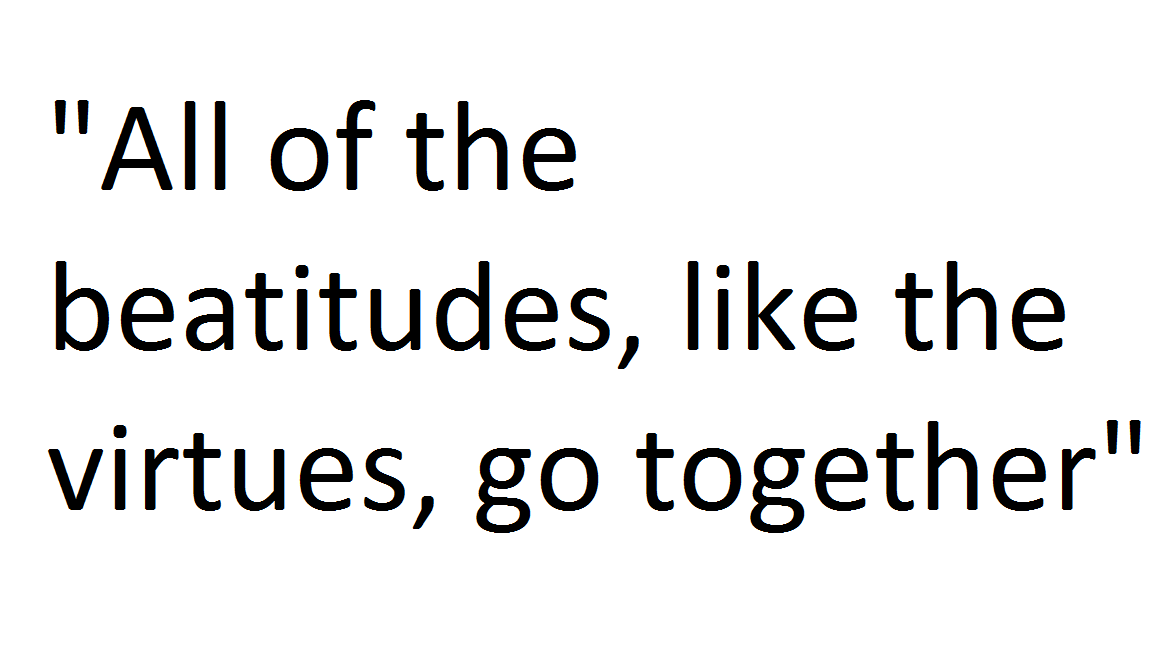Blessed are those who are persecuted for righteousness’ sake, for theirs is the kingdom of heaven. Blessed are you when men revile you and persecute you and utter all kinds of evil against you falsely on my account. Rejoice and be glad, for your reward is great in heaven, for so men persecuted the prophets who were before you. (Mt 5:10-12)
He includes those in the beatitude whose will is ready to suffer all things for Christ, who is our righteousness. For these then also is the kingdom preserved, for they are in the contempt of this world poor in spirit. (St. Hilary of Poitiers)
It may seem to be extreme, for us who work to uphold the true meaning of marriage to think of ourselves as “persecuted,” especially in the sense that we say the early Christians were persecuted. And indeed, playing the martyr does not get one very far with those whom one perceives to be doing the persecuting. Even if there is some element of truth in it, it’s a dangerous and tricky thing to speak and behave as if one is the victim of vicious persecution.
This claim needs to be carefully articulated: it’s certainly the case that religious liberty is being superseded in various ways today in the name of equality and fairness and “civil rights”—and people on both sides of the marriage debate have readily acknowledged this fact. But the early Christians were put to death for confessing their faith in Jesus Christ. This is a different sort of thing than experiencing various forms of social injustice which are certainly wrong but are also non-lethal.
But the comparison, careful as we must be in making it, is not totally devoid of value. It’s not helpful to portray ourselves as living martyrs in response to the many trials Christians have undergone, are undergoing, and will undergo because of various government infractions or in response to the attempt to change the very definition of the fundamental institution which is the heart and foundation of the family, the “basic cell of society” (as St. John Paul II often called it); but it is helpful to see how the early Christians lived even in the midst of their own persecutions.
 Our Christian tradition is full of inspiring stories of holy patience in the face of intense persecution and suffering, of courageous martyrdom, and even of humor. (St. Lawrence, burned alive on a grill in 258, famously quipped as he was tortured, “You may turn me over, I’m done on this side.”) But St. Hilary of Poitiers, who died in 368 and thus knew well the gruesome details of the persecutions inflicted on the Christians who went before him, beautifully sums up the attitude of those who are persecuted for the sake of righteousness: they are “poor in spirit.” By referring this last beatitude back to the first, he implies that all of the beatitudes, like the virtues, go together: where one is found, the others may be found too. The early Christians were able to submit to persecution and even to martyrdom, and survive it, thanks to the grace of God which enabled them to live according to the Beatitudes, to live lives completely oriented towards God.
Our Christian tradition is full of inspiring stories of holy patience in the face of intense persecution and suffering, of courageous martyrdom, and even of humor. (St. Lawrence, burned alive on a grill in 258, famously quipped as he was tortured, “You may turn me over, I’m done on this side.”) But St. Hilary of Poitiers, who died in 368 and thus knew well the gruesome details of the persecutions inflicted on the Christians who went before him, beautifully sums up the attitude of those who are persecuted for the sake of righteousness: they are “poor in spirit.” By referring this last beatitude back to the first, he implies that all of the beatitudes, like the virtues, go together: where one is found, the others may be found too. The early Christians were able to submit to persecution and even to martyrdom, and survive it, thanks to the grace of God which enabled them to live according to the Beatitudes, to live lives completely oriented towards God.
For us, then, who are not being nailed to crosses, burned alive, stoned to death, beheaded, shot full of arrows, skinned alive, or hacked to death, but who do endure various difficulties and trials of our own for upholding the truth about marriage—and for those in our midst who themselves experience same-sex attractions and struggle to approach Christian perfection through the chastity to which they are called—the early Christians can serve as models: since we are surrounded by so great a cloud of witnesses, let us also lay aside every weight, and sin which clings so closely, and let us run with perseverance the race that is set before us, looking to Jesus the pioneer and perfecter of our faith, who for the joy that was set before him endured the cross, despising the shame, and is seated at the right hand of the throne of God. (Heb 12:1-2)
~
This series is a guest contribution by a Dominican student brother who has been fulfilling his pastoral ministry assignment by serving as an intern at the USCCB’s Secretariat for Laity, Marriage, Family Life, and Youth.

Leave a Reply